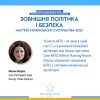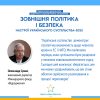Comment by Alyona Getmanchuk for Financial Times.
The former television comedian has made a political career out of his performances before a live audience and this was no exception. Even better, he had outlasted Vladimir Putin, the Russian president known for his lengthy exchanges with the media.
Mr Zelensky batted away questions about Mr Trump. With a grasp of policy detail patently lacking only months before, he laid out his vast ambitions to remake Ukraine into a dynamic market economy free of the corruption that has left it one of the poorest countries in Europe. But he failed to dispel doubts about his own independence from oligarchs and his willingness to fight back against corporate capture of the state.
“It is like a movie with two storylines,” says Svyatoslav Vakarchuk, a Ukrainian singer who now leads Holos, a reformist party. “We don’t know how it ends.”
Transformative moderniser or a politician beholden to bigger interests? It is a question Ukrainians and their western backers were grappling with well before Mr Zelensky was sucked into allegations that Mr Trump tried to force him to open a corruption probe into the son of 2020 Democratic presidential hopeful Joe Biden — claims that are now at the centre of impeachment proceedings in Washington.
Mr Zelensky was elected vowing to sweep aside corruption and politically-motivated manipulation of the judicial system and here was Mr Trump, allegedly, pushing him to pursue an investigation for political ends.
The phone call exposed a rift between Kiev and the White House just when Mr Zelensky needed strong US backing to help persuade Moscow to end the war in eastern Ukraine, which has cost more than 13,000 lives. Mr Zelensky has sought to restart peace talks with the Kremlin, making concessions that his domestic opponents fear are leading to a Ukrainian capitulation.
“The message Trump sent to Zelensky was quite clear: meet Putin and solve your problem,” says Alyona Getmanchuk, director of the New Europe Center, a Kiev think-tank. “Ukraine is becoming more and more isolated in dealing with Putin.”
Ukraine may appear to be at the mercy of bigger powers, but it still has the ability to shape its own destiny and build a free society, says Mr Vakarchuk, who supports the new president’s objectives but worries about his lack of respect for Ukrainian institutions.
The new government has set extraordinary ambitions. As well as peace in the Donbas region and the end of corruption, it is aiming for cumulative growth in gross domestic product of 40 per cent over five years and 5m new jobs in sectors ranging from manufacturing and agriculture to IT in a bid to attract some workers home and persuade others not to leave in the first place.
In recent weeks, Ukraine’s parliament has passed scores of bills intended to upgrade the economy and modernise the state, sometimes with barely any debate or scrutiny. There are new rules on port and infrastructure concessions, resource extraction, consumer protection, securities regulation, the unbundling of the state-owned natural gas company and the digitisation of customs clearance and other services.
“We have a lot of energy,” Oleksiy Honcharuk, the prime minister, told the Financial Times. “And we have almost no time. We need to adopt [laws and reforms] in the next couple of months. Then we will have more or less a year for implementation. And then we need growth.”
Tymofiy Mylovanov, economy and trade minister, admits the pace of change is “insane”. There will be mistakes, he says, but haste is necessary.
Only a few weeks ago the US-trained academic was giving maths classes at the Kyiv School of Economics. Now he is in charge of the three biggest economic reform dossiers: privatisation of several hundred state companies, legalisation of land sales to make the most of Ukraine’s vast agricultural resources, and an overhaul of the labour market.
These reforms, called for by investors and international institutions, have long been stymied by a political system dominated by Ukraine’s powerful oligarchs and other interests. Now they are being pushed through in a matter of minutes.
“A lot of this is about overshooting,” says Mr Mylovanov. “We have to be able to break the chains. Once you are in the new equilibrium you can think again about the balance.”
“They are really trying to do things fast,” says Kira Rudik, an opposition Holos MP. “Some of the things look like homework done in a rush the night before.”
Ms Rudik embodies the potential of the younger generation. The 34-year-old IT specialist founded the Ukraine research and development division for Ring, a US start-up making security devices, which now employs several hundred engineers in Kiev. Ring was sold to Amazon for $1bn last year and Ms Rudik quit the business to enter politics. Ukraine has, she says, the feel of “a start-up with a slogan written on the wall ‘Go fast and break things’”.
But what is good for a tech company is not necessarily good for a country where the rule of law has often proved elusive. The government’s rush to overhaul the economy and the judiciary are also providing opportunities for vested interests, including powerful oligarchs, to assert their influence, in all sorts of ways, including using friendly MPs to draft or amend legislation.
“Bad boys sneaking in their laws,” says Ms Rudik.
Mr Mylovanov tells his own anecdote. Presented with a stack of papers by his private office, the economy minister began to flick through them adding his signature. Then he paused and decided he better examine each one more closely. In the middle of the stack was a contract for a staffer he did not know. He summoned the man, who explained he was a security liaison who had been employed by the minister’s predecessors. Mr Mylovanov made his own inquiries: neither the security services, the interior ministry nor the presidential administration had anything to do with him. The man was fired.
“We are working in an extremely hostile environment,” he adds. “We have to take control first.”
Some Ukrainians worry that Mr Zelensky has taken too much control and might be showing an authoritarian streak. He sacked the members of Ukraine’s elections commission, which was regarded as a credible watchdog, and filled it with loyalists. He plans to reshuffle Ukraine’s recently reformed Supreme Court, prompting a warning shot from the Council of Europe over respect for the rule of law. He described Ruslan Ryaboshapka, Ukraine’s new chief prosecutor, to Mr Trump as “100 per cent my person”.
Perhaps the biggest question hanging over Mr Zelensky is his relationship with Igor Kolomoisky, the billionaire oligarch, whose television station helped turn the comedian into a star and gave his election campaign wall-to-wall coverage.
Mr Kolomoisky returned to Ukraine following Mr Zelensky’s election victory. He had been living in exile in Israel fearing possible fraud charges in connection to his former ownership of PrivatBank, still Ukraine’s largest lender. The bank was nationalised in 2016 after regulators found a $5.5bn hole in its balance sheet from fraudulent and related-party lending. Mr Kolomoisky is fighting to have the nationalisation overturned, a move that could imperil financial stability and spur the IMF to withhold a new lending programme.
The issue has become the biggest test of Mr Zelensky’s commitment to the rule of law and to ridding Ukraine of oligarchic influence, all the more so because the president chose as his chief of staff Andriy Bogdan, a lawyer who previously represented Mr Kolomoisky in the PrivatBank affair.
Concern intensified in September when police raided the headquarters of PrivatBank, now under state-appointed management, and the Kiev home of Valeria Gontareva, the former head of Ukraine’s central bank, who oversaw the clean up of a rotten banking system. Days after the police raids, Ms Gontareva’s dacha outside the capital was firebombed, prompting outrage at a campaign of intimidation and a promise of an investigation from the president.
Mr Zelensky’s stance on PrivatBank remains ambiguous. Mr Honcharuk suggested last month that the president and his chief of staff were ready to compromise with Mr Kolomoisky, although he subsequently said he had been misinterpreted.
Fears that the president and Mr Bogdan were about to cave into Mr Kolomoisky triggered the resignation in late September of Oleksandr Danylyuk, a former finance minister and respected reformer, as the head of Mr Zelensky’s National Security and Defence Council.
Mr Zelensky said on October 10 that “it makes sense to talk to him [Kolomoisky]” but he should not expect to receive a *single kopek” from any deal.
“He needs to wake up quick,” says Tim Ash, an emerging markets strategist at BlueBay Asset Management. “This is bigger than his mate Kolomoisky. His decision will set the course of his presidency. Either he is in the pockets of the oligarchs, or certain oligarchs, or he is truly representing the interests of the people.”
One western official says a planned overhaul of the electricity market might be a way for Mr Kolomoisky, who owns ferro alloy plants, to pay less for power than the prices he is currently charged by rival oligarchs. “Kolomoisky wants to be sitting on high and pulling strings behind the scenes,” the official says. “It’s very smart what they are doing.”
But Kateryna Rozhkova, deputy governor of the central bank, says that “if [PrivatBank’s] nationalisation is cancelled it would be a bright red warning signal for reformers, investors, IFIs and donors”.
She is urging Mr Zelensky and his government to issue an unequivocal statement saying the PrivatBank nationalisation was necessary to preserve financial stability, that it complied with Ukrainian law and that banks cannot be returned to their shareholders even if they have a right to claim compensation for losses, if they can prove them.
Even before the Trump imbroglio, Mr Zelensky’s young presidency was a story of reformist idealism marred by suspicion that the new generation could be yet another political vehicle for corporate capture of the state.
Ms Rozhkova, whose eyes well up when describing the intimidation of her former colleague Ms Gontareva, wants to accentuate the positive. “We need to talk about not just the dark side of the moon,” she says, “but the light side too.”







